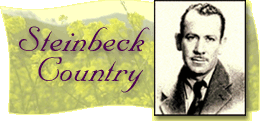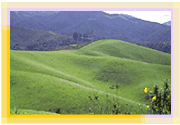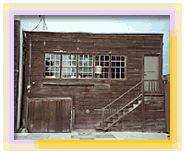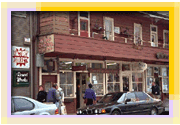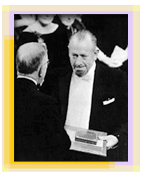 |
 |
 |
|
|||
|
Steinbeck Country The Salinas Valley is an 85-mile patchwork of lettuce and strawberry fields, dotted by farming towns. John Ernst Steinbeck grew up here and wrote about the people with unvarnished honesty. In exchange, the elders of his hometown, Salinas, shunned him as a troublemaker. Even today, on the streets, the ghost of his bad reputation lingers.
On Central Avenue I locate the stately Victorian mansion where Steinbeck was born in 1902. I am searching for signs of Steinbeck, the black sheep. [Sounds of restaurant crowd...] Instead, I find a restaurant, run by a Steinbeck preservation group in what would have been the family parlor. The chicken pot pie and peach cobbler are delicious, although the look on Ma Steinbeck's face says she could do better.
Just twenty miles west, but a world away lies the seaside town of Pacific Grove and a street called Cannery Row. Today, it's a bustling tourist Mecca, with wax museums and fudge shops.
On the surface, there's not much of the brawling sardine canning town Steinbeck observed when he moved here in 1930. Here are the opening lines of his novel, Cannery Row.
"Cannery Row in Monterey in California is a poem, a stink, a grating noise, a quality of light, a tone, a habit, a nostalgia, a dream." There's something romantic about the old Cannery Row of Steinbeck's day. If you sit by the rocks on a foggy day, and listen to the sea lions barking off Point Pinos, you can conjure it back. Steinbeck described silver rivers of sardines pouring out of boats and into canneries which rattled and screamed round the clock. At the fringes of this boom town, Steinbeck met a string of motley characters who often ended up in his books. When the fog is thick enough, you can almost see the ghost of Doc Ricketts collecting starfish for his lab or Mac and the boys returning from a frog hunt.
"The bums who retired in disgust under the black cypress tree come out to sit on the rusty pipes in the vacant lot. The girls from Dora's emerge for a bit of sun if there is any. Doc strolls from the Western Biological Laboratory and crosses the street to Lee Chong's grocery for two quarts of beer." Lee Chong's grocery now sells trinkets, but next door, La Ida's bar retains much of its old character. It's now called Kalisa's after its owner, Kalisa Moore. She loves to recount the events, real and fictional that happened here.
Kalisa met Steinbeck in 1962. By then he was a major literary figure, having won the Pulitzer Prize for the Grapes of Wrath, and the Nobel Prize for literature. He came back from New York, looking for old friends.
I can picture Steinbeck in his twilight years, brooding over a beer, missing his old friend Ed "Doc" Ricketts,the brilliant marine biologist who was killed by a train in 1948. Across from Kalisa's is one of the main attractions of Cannery Row. The Monterey Bay Aquarium stands on the site of the old Havden Cannery and still resembles it from outside. Biologist Steve Webster is one of its founders.
The aquarium used to blast the whistle every day at opening time, but visitors complained it was too loud.
"And the whistle blows again, and the Wops and Chinamen and Pollaks, men and women, straggle out and droop their ways up the hill into the town and Cannery Row becomes itself again, quiet, and magical." The canneries are quiet now. They went belly-up in the late forties when the sardine fishery crashed. Steinbeck, the struggling young writer of Cannery Row, went on to become one of the great writers of our time.
John Steinbeck died in New York in 1968. He is buried in the Garden of Memories cemetery in Salinas. I'm Rachel Anne Goodman, For The Savvy Traveler.
|
 | American Public Media Home | Search | How to Listen ©2004 American Public Media | Terms of Use | Privacy Policy |
